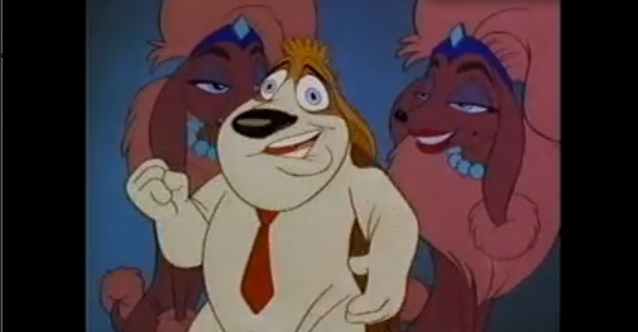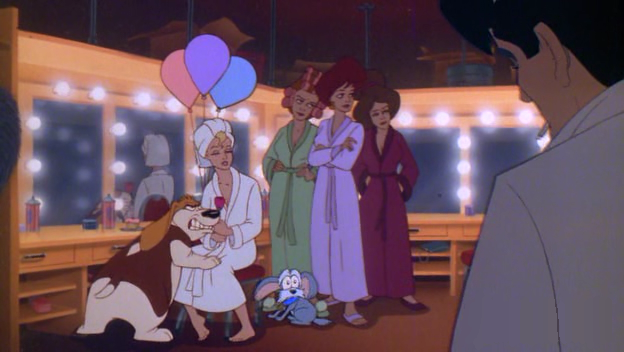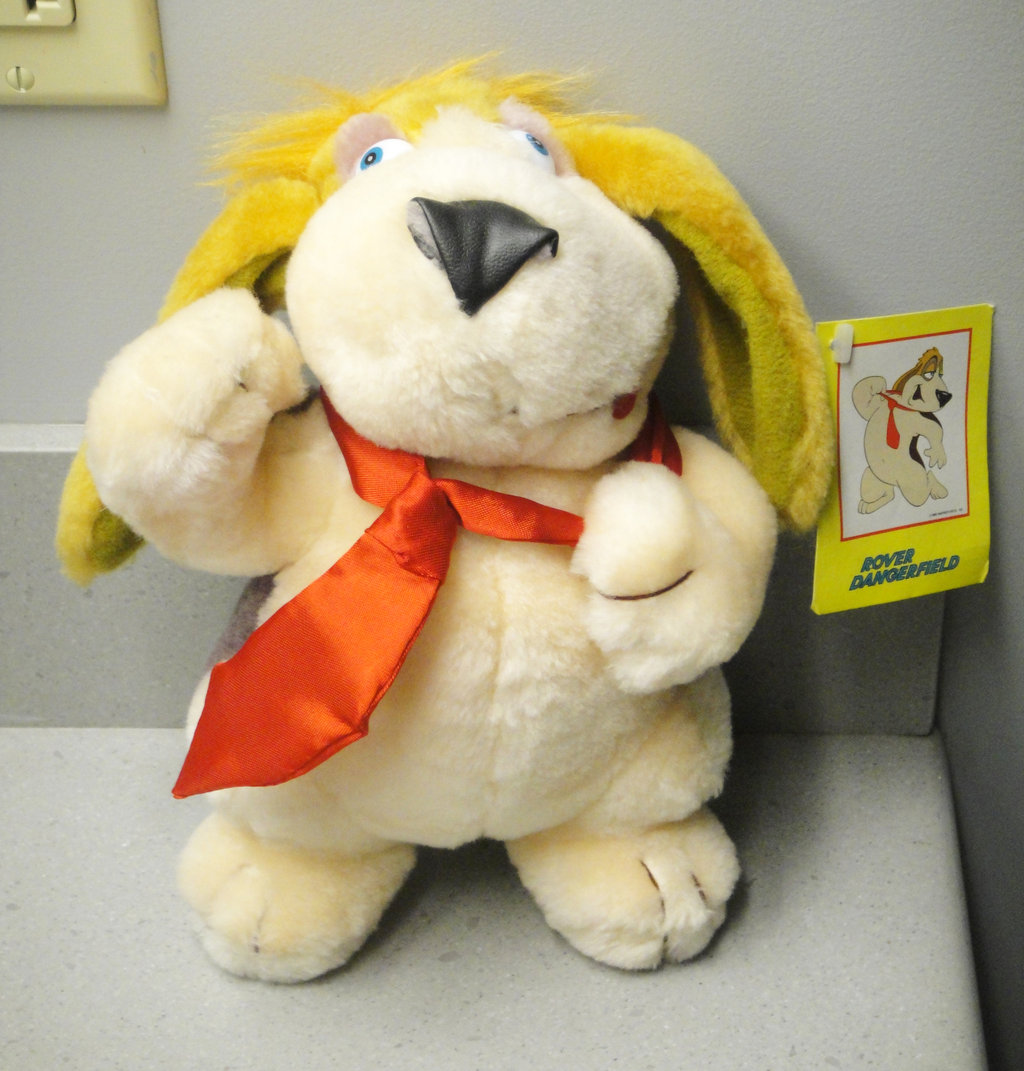Rover Dangerfield Began as an R-Rated Movie for Adults and Flopped as a G Rated Movie for No One
That cartoon dog sure loves to gamble and chase tail.
The flurry of live-action and animation-blending movies that followed in the wake of Who Framed Roger Rabbit’s groundbreaking, unrepeatable success all set out to be sexy and dark in the same way that Robert Zemeckis’ zeitgeist-capturing masterpiece was but just ended up being inappropriately sexual and unnecessarily dark.
That is most assuredly true of the bizarre 1991 boondoggle Rover Dangerfield, which began life as a Ralph Bakshi-style R-rated comedy for adults to be released late in 1988 but ended up flopping big time in 1991 as a G-rated feature for the whole family.
Yet Rover Dangerfield’s R-rated soul is constantly seeping through. For example, the film’s protagonist, a dog version of Rodney Dangerfield, is introduced rolling Craps, leering at the cleavage of a sexy fellow dog, making crude double entendres and taking about how much he loves Vegas. And why does Rover love Vegas so much? Well, he’s not terribly explicit about it, but he clearly loves Sin City because it’s a place where a degenerate piece of shit like him can indulge his gambling addiction all hours of the day and night, chase showgirls and stick his bone wherever he damn pleases, if you get my crude double entendre. I'm talking about his penis.
But Rover Dangerfield is G for some reason so while it pretty much explicitly lays out that its protagonist is a disturbingly, unnecessarily sexual creature, he’s also a lovable cartoon mutt, so as far as the MPAA is concerned, all of this is conjecture and implication even though, again, this is a cartoon dog that clearly fucks, as evidenced by an opening ditty where he croons lasciviously, “I’m never lonely, I’ve got girls galore, I just got rid of three and now I’m down to four!”
In a jovial, party mood, Rover says to his fellow party dogs of his plans for yet another debauched night out on the town, “We’ll paint the town yellow!” I could be wrong, but I think “yellow” refers to urine. That’s one more urine joke than I would have imagined in a G-rated animated comedy about a city dog who ends up on a farm.
Rover loves Las Vegas partially because it’s full of toadies and sycophants and ass-kissers who, like the supporting cast of every Rodney Dangerfield movie, animated or live-action, simply cannot get enough of him. Why, in Rover Dangerfield he’s got a whole animal entourage on hand to laugh at his jokes.
This is the eighth and final film I will be writing about for No Respect January. I think I’ve figured out why I’m so annoyed by the reaction shots in all of Rodney’s movies of other characters laughing uproariously at his jokes. It’s because this unearned, forced laughter functions as makeshift, de facto cinematic laugh tracks. Only instead of a ghostly assemblage of anonymous laughter, the guffaws for lines like “He’s a real workaholic. You mention work, he gets drunk!” are supposed to emerge organically from farm animals overjoyed by the Catskills comedy stylings of Rover Dangerfield, who is a dog, sure, but also a performer and entertainer not unlike Rodney Dangerfield.
#RatedG
I understandably assumed that Rover’s owner would be an adorable girl or boy who would serve as a surrogate for the kids in the audience. Nope, Rover’s owner is a chorus girl with the physique of a 1960s Playboy playmate and a wardrobe that emphasizes and flatters her bodacious curves.
Rover’s owner is drawn like a masturbatory fantasy. Her boyfriend, Rocky, meanwhile, with his ominously drooping eyebrow and air of brutish menace, looks like an evil Dean Martin dying from consumption.
Rocky is evil on the outside but even more evil on the inside. He’s clearly a one-dimensional, homicidal, philandering sociopath, which makes Rover’s owners’s love for him a little perplexing and not entirely convincing.
In a remarkable display of poor judgment, Connie decides to go on tour, leaving Rover in the care of Rocky, who decides to murder him by throwing him off the Hoover Dam to a horrible, violent death, only instead of shattering all of his bones upon impact, Rover ends up surviving and winds up on a farm. Have I mentioned yet that the movie is rated G?
There is a germ of a good idea, or at least a familiar idea, at the heart of Rover Dangerfield. A lot of the comedian’s biggest successes were fish out of water comedies: Rodney as a vulgar nouveau riche Jewish millionaire in a WASP country club (Caddyshack)! Rodney as a vulgar nouveau riche millionaire at a preppie college (Back to School)!
In a similar, but much stupider vein, Rover Dangerfield put a big city dog on a sleepy old farm and somehow imagined that the kids of the early 1990s would go nuts over an achingly slow farm comedy-drama of self-actualization centered on the achingly vanilla romance involving Rover Dangerfield, confirmed pussy wolfer, and Daisy, who is like a canine version of Andie McDowell: very beautiful and very boring.
Daisy sees the potential in Rover and encourages him to chase his dreams and believe in himself and all the other horse shit you find in kids movies like these.
Love interests and romantic subplots don’t even work in live action Dangerfield movies. What made them think that audiences would go in for the sappy romantic stuff if Dangerfield was playing an anthropomorphic animal? Ah, but Rover Dangerfield isn’t just about farm comedy and bland romance: it’s also about Rodney Dangerfield singing.
Yes, in its sadistic attempt to stretch this flimsy conceit to just barely just feature-length, Rover Dangerfield is a fucking musical whose perpetually wavering momentum grinds to a complete stop so that the red tie-wearing titular canine can croon some of the worst songs ever written.
The worst of a sorry lot is “I’ll Never Do It On a Christmas Tree”, a Yuletide ditty of questionable taste about how Rover has so much respect for the solemnity of Christmas that he would never lustily urinate on a Christmas tree the way he would every other kind.
Why? Why must there be songs in every goddamn children’s movie? This doesn’t need songs. It doesn’t need romance. It doesn’t need to exist at all.
A stuffed animal unworthy of respect.
Like a lot of terrible kiddie movies that somehow got away with a G rating, and thus an unearned opportunity to traumatize kids in a bad way, Rover Dangerfield has such a hard-on for death that it sometimes starts to feel like some bizarre form of animated, family-friendly snuff film.
Rocky, the disturbingly designed boyfriend, who clearly fucks around on his girlfriend, probably beats her up and may even have a Steve Martin in Little Shop of Horrors-style sadist complex going on, kicks off the plot by trying to murder the titular animal.
After that, the specter of death continues to haunt Rover, and by extension the film. The stakes could not be higher. If Rover shapes up and proves that he can follow directions and fit in on the farm, then he might earn a permanent place there. If not, well, that’s what shotguns and shotgun shells and tough but fair-minded fathers who don’t flinch when it’s time to pull the trigger and send even an animal he likes from this world into the next are for.
Rover Dangerfield really leans into the notion that Rover might end up being put down to create an artificial sense of urgency and just ends up creating a kid’s movie that’s incredibly inappropriate for kids. When it comes to smuggling dark, smutty, scary, child-frightening content in a G-rated family film, Rover Dangerfield gets away with just about everything. Creatively, it gets away with just about nothing.
This has been a long, long day for me. I wouldn’t have clicked play on Amazon if this hadn't run a lean 73 minutes long. Looking at Amazon, I found myself thinking, “73 minutes? That’s nothing. I can power through that easy. Bring it on!” Ten minutes later, I found myself thinking, “Christ, why did I start watching this movie? It’s 73 minutes long. That's a fucking eternity!
Rover Dangerfield ends not just with the clear implication that Rover Dangerfield is a wacky G rated cartoon dog that fucks, but with concrete evidence that Rover Dangerfield’s seed is potent and his sexual appetite rapacious. The film ends with Rover siring a litter of puppies with Daisy that stand as adorable living proof that their parents had sex, and probably a fair amount if Rover’s many suggestive allusions to his sexual desire and lust for the mother of his children are any indication.
Heck, this G-rated smut fest ends with Rover chasing deliriously after his mate in a fit of lust, waggishly assuring us that when he wants to catch Daisy he’ll catch her, and then clearly have even more uninhibited sex. Confusingly and disturbingly enough, however, the puppies chase after Rover as he lustily tries to get his fuck on. Thankfully the movie ends before showing us the puppies watching their parents have sex. That’s merely the very strong implication in a film-closing bit that illustrates the incredible level of miscalculation and bad judgment that defines every aspect of this movie.
In this movie, the dad, who is convinced that he’s going to have to disappoint his son by putting a few bullet holes in Rover’s head, tells his son that Rover does not look intelligent. He’s a dog and he’s wearing a fucking tie. I think that’s a little more advanced than you, farmer psycho, just waiting for your chance to end another life and rationalize it to traumatized sonny boy as part of life’s great cycles of life and death.
Rover Dangerfield is undoubtedly the most poignant failure from this phase of Dangerfield’s career because he clearly wanted to crack this freshly-scrubbed Walt Disney Midwest world of farms and funny farm animals and show-tunes and star-crossed romance so badly and failed on every conceivable level.
Dangerfield didn’t just lend his name and persona and voice to the film: it’s the only film in which he has a solo screenplay credit, although litigation resulted in Harold Ramis sharing a “Story developed” by credit with Dangerfield for working on the script with Dangerfield at a very early stage, before, I would imagine, it became apparent to everyone involved that it would be a world-class embarrassment.
The vulgar, boozy, drug-addled depressed Jewish city slicker was going to win the hearts of middle America as a lovable dog with a song in his heart and a wisecrack perpetually on his lips. It was not to be. Rover Dangerfield plush dolls and figurines were made, but went unsold. The soundtrack featuring the song about how Rover loves Christmas so much he’ll never unleash a firehose-like torrent of urine onto its branches and ornaments, co-written by Rodney himself, was purchased I would imagine primarily, if not exclusively, as a pretty inspired gag gift. Incidentally, if you ever wanted to get me a gag gift, that would be a good idea.
Oh, the merch!
In his brief heyday, Rodney succeeded on so many different stages. Movies! Nightclubs! Comedy albums! Novelty rap songs! The Tonight Show! TV specials! The boom was short, however. By this point, Rodney was failing at everything: animated movies! Weird fantasy sitcoms! Inappropriately sexual cross-dressing kid’s films!
After their work together with Caddyshack and Back to School, it makes sense that a powerful figure like Harold Ramis would want to work with a comic genius like Rodney Dangerfield again but this marked a turning point in Dangerfield’s career. In the decade and a half ahead, Dangerfield’s vehicles would overwhelmingly skip theaters en route to being seen by a small, undiscriminating audience of true believers motivated more by pity than genuine excitement. Rodney was still big but the movies had gotten so small that they would barely exist.
Check out my Substack here
Did you enjoy this article? Then consider becoming a patron here
AND you can buy my books, signed, from me, at the site’s shop here











